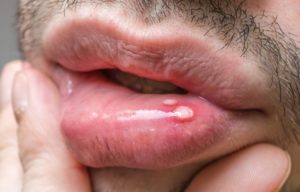
Having spots appear on your mouth and lips isn’t just unattractive, it’s also uncomfortable. Unfortunately, oral sores are a relatively common issue, and there are numerous different types. These include canker and cold sores that seem to take forever to go away. Because these can be so uncomfortable to deal with when you talk and speak, knowing how to ease your pain and get rid of them faster can help make your life a lot easier if you frequently get them. Read on to learn about different types of canker sores and how your dentist can quickly treat them.
What are Canker Sores?
Canker sores only form on the inside of your mouth and are typically found in these areas:
- On the gums.
- Inside of the cheek.
- Inside of the lip.
- On or below the tongue.
- On the back roof of your mouth, also known as the soft palate.
They can be incredibly uncomfortable when they form because they often cause a burning or tingling feeling. Typically, the appear in the form of a circle or oval and are white, yellow, or surrounded by a red border. Major canker sores that are large can be incredibly uncomfortable and may take longer than a small one to heal.
Herpetiform canker sores are less common, but they look like clusters of small pinpricks. These usually occur in more mature people.
What Causes Canker Sores?
Researchers aren’t entirely sore what directly causes canker sores, but they do know that, unlike cold sores, these aren’t contagious. Studies have looked at some of the following possible triggers for canker sores:
- An oral injury inside the mouth.
- Nutrient deficiencies in vitamin B-12, iron, or folate.
- Using oral hygiene products that contain sodium lauryl sulfate.
- Stress.
- Hormone fluctuations caused by menstruation, pregnancy, or gender-affirming hormone therapy.
- Reactions to certain foods.
- Medical conditions that affect your immune system.
If you regularly get canker sores, you can speak with your dentist or doctor about possible prevention techniques and tips.
How Can You Treat Oral Sores?
Smaller canker sores will usually go away on their own within a couple of weeks, but for larger ones, it’s a good idea to take action to ease your discomfort and attempt to get rid of it sooner. Here are some steps you could take to treat the symptoms caused by your large canker sore:
- Get an over-the-counter cream or gel that contains active ingredients such as benzocaine, hydrogen peroxide, and fluocinonide.
- Ask your dentist for a prescription mouthwash that contains dexamethasone.
- Speak with your dentist about oral medications if your canker sore doesn’t respond to other treatments.
If you have a problem with frequently developing these sores, it’s a good idea to get a professional examination to rule out any chance of oral cancer. Plus, with help from your dentist, you can protect your mouth from developing these in the future and causing you pain.
About the Author
Dr. Peter St. Clair has been helping ease his patients’ pain and protect their mouths from future damage by tackling problems sooner rather than later. He regularly completes continuing education courses so he can stay up-to-date with the latest treatments and technology in the dental world. He is also an active member of several professional organizations, including the American Dental Association and the Academy of General Dentistry, to name a couple. For questions or to schedule an oral checkup and cancer screening, visit Dental Partners of Newburyport’s website or call 978-465-5358.
 (978) 465-5358
194 High
St
(978) 465-5358
194 High
St